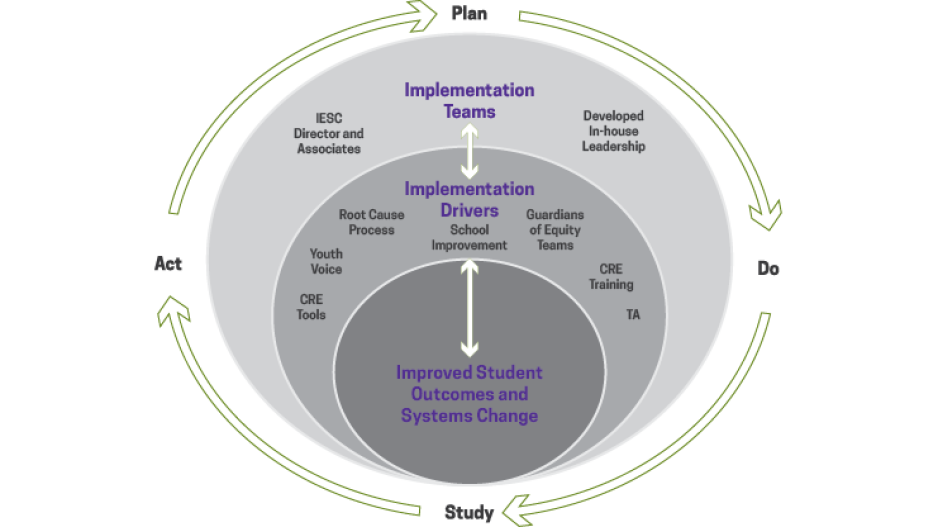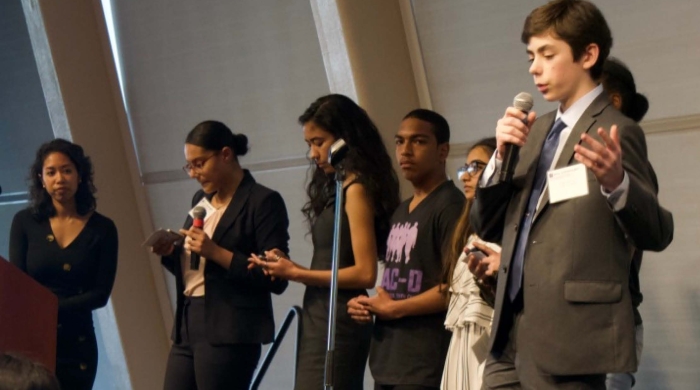
The Innovations in Equity and Systemic Change (IESC) at NYU Metro Center (Previously TAC-D) provides professional development, technical assistance, and consultancy to educational institutions in general and special education. Our mission is to disrupt, dismantle, and eliminate disproportionality by building the capacity of educators to implement Culturally Responsive Sustainable Equity-Based Systems that meet the needs of all students and families.
Why: Importance of the Work
- Develop equitable systems to ensure equitable outcomes for all students
- Incorporate culturally responsive education into beliefs, policies, practices, and procedures to create sustainable system-wide structures
- Develop a “systems” thinking approach to resolving root causes of inequitable outcomes
- Embrace all differences and reject a deficit model
How: Principles of Practice
- We adapt systems to be responsive and ensure success for all stakeholders
- We build transformational relationships with all stakeholders
- We integrate implementation science, organizational learning, emotional intelligence, and reflection mechanisms into strategic solutions
- We utilize evidence-based interventions and school improvement leveraging these essential supports: Leadership, Professional Staff Capacity, Instructional, Guidance, Student Centered Learning Climate, and Family and Community Ties in the classroom, school, district, and community for addressing disproportionality and creating equitable systems (adapted from Bryk et al., 2010)
Usable Practices
Building capacity through Culturally Responsive and Sustaining Equity-based Systems development and support

Improvement Cycles
What: Phased Approach*
Phase 1
- Secure institutional support to address disproportionality and equitable systems
- Develop Relationships
- Determine needs and negotiate services
Phase 2
- Identify Root Causes of disproportionality and inequities; and develop 3-year Multi-Year plan
Phase 3
- Implement changes in beliefs, policies, practices, and procedures related to disproportionality and equity
- Provide customized technical assistance, professional development, and consultancy
- Leverage implementation science in creating and supporting Guardians of Equity teams to continue problem solving and addressing root causes
Phase 4
- Evaluate changes in in beliefs, policies, practices, and procedures, and measure progress based on Multi-Year strategic plan
Culturally Responsive Practice-based Toolkit
- Curriculum & Instruction Observation Checklist
- School-Wide Cultural Continuum Rubric
- Culturally Responsive Classroom Environment Tool
- Guidelines for Evaluating Culturally Responsive Materials
- Evaluation of Intervention Services
- Guardians of Equity: Culturally Responsive Equity-Based
- Decision-Making Protocol
- Monthly Equity Calendar
Why: Importance of the Work
The root cause process consists of technical assistance sessions with an educational institution’s root cause team. With the support of IESC, the team collects and reviews qualitative and quantitative data to identify the possible causes of disproportionality, as well as possible solutions to disproportionality and inequitable outcomes.
We conduct a six-part series that identifies root causes of inequitable outcomes. The goal of the root cause analysis is to: (1) identify the possible root causes and compounding factors of disproportionality and larger inequities, (2) examine and identify beliefs, policies, practices, and procedures that contribute to disparate outcomes, (3) explore how race, culture, and privilege perpetuate inequities and disproportionality, (4) develop a research based plan designed to address identified root causes. IESC will achieve these goals through an iterative process of facilitated meetings, TA, data collection, and analysis.
- Session 1: Understanding Disproportionality
- Session 2: Examining Disproportionality and Equity
- Session 3 and 4: Getting to Root Cause
- Session 5 and 6: Root Cause Report and Action Planning/ Multi-Year Strategic Plan
Culturally Responsive Education (CRE) Training:
IESC’s theory of change is grounded in the belief that in order to successfully address disparate outcomes for students of color, students with disabilities, including ELLs/MLLs, specific attention must be paid to intersecting Critical Race Theory and the Eight Principles of Culturally Responsive Education (Ladson Billings, 1994; Ladson-Billings & Tate 1995) and Culturally Responsive-Sustaining (CR-S) Education as defined by the New York State Education Department (NYSED). Thus, all of IESCs work is informed by an understanding of the ways in which race and culture impact the educational experiences of students. We have found that when educators are equipped with explicit understanding about how race, ethnicity, language, and culture influence learning outcomes, we can significantly reduce the likelihood of disparate outcomes.
Through the marriage of theory and practice educators critically examine the racial and cultural components of their educational institution’s beliefs, policies, practices, and procedures, and how each shapes an educator’s everyday interactions with students and families. The series works towards cultivating a training experience where educators:
(1) Begin to develop mindsets that eliminate educational barriers (Milner, 2010); (2) Begin to embrace asset-based pedagogy (Paris, 2012); (3) Begin to understand how to use race and culture to improve educational outcomes (Howard, 2010); (4) Engage in a process of self-transformation in order to ensure equitable outcomes for all (Banks, 2007); and (5) Reach an understanding that education is a social experience that requires both culturally responsive dialogues and relationships to develop (Powell & Rightmyer, 2011).
In addition, IESC uses research-based fidelity indicators triangulated with the data collected from the Color-Blind Racial Attitudes Scale (CoBRAS) survey conducted in Sessions 1, 3, and 5 of the CRE trainings to assess changes in beliefs contributing to disparate outcomes.
- Session 1: What is Culture and What Relevance Does It Play in Schools Aiming for Equity?
- Session 2: What do we Need to Know About Ourselves in Relation to Identity and Power?
- Session 3: How does Racial/Ethnic Identity Impact Racially and Ethnically Diverse Students?
- Sessions 4 and 5: Given our New Perspective, What Policies and Practices will be Changed?
- Session 6: Culturally Responsive Systems Toolkit
Guardians of Equity Teams:
This data-driven system is designed to have practitioners work together in small groups to transform policies, practices, and procedures that are perpetuating current inequities. Participants will be able to engage in three primary acts: (1) Design a plan to implement equity-based culturally responsive systems; (2) apply culturally responsive principles to examine data (e.g., discipline referrals, academic referrals, course failure rates by content area) and develop culturally responsive principled solutions to these outcomes; and (3) develop a customized action plan to address inequities supported by IESC (e.g, school visits, addressing one or more essential supports, progress monitoring programs and initiatives).
Youth Voice:
Through a Youth Participatory Action Research (YPAR) model IESC has developed curriculum to support educational institutions in partnering with youth to build competency among students on disproportionality. This approach leverages youth in developing recommendations to shift beliefs, policies, practices, and procedures that are resulting in larger systemic inequities.
Explore our recently released youth-manual:
Additional Technical Assistance and Professional Development Offerings:
- Culturally Responsive Data Systems
- Culturally Responsive Curriculum and Instruction
- Culturally Responsive Curriculum Review and Audit
- Culturally Responsive Alternatives to Suspensions
- Culturally Responsive Behavioral Systems
- Culturally Responsive Restorative Practices
- Culturally Responsive Multi-Tiered Systems of Support
- School Walkthroughs and Feedback
Our Team
Contribute to education equity and school transformation!
Donate to NYU Metro CenterMetro Center Intake Form
This Intake Form should be completed only if you are interested in a fee for service partnership with NYU Metro Center. We are excited for new collaborations or partnerships and can't wait to serve your community!
Please fill out the Intake Form here





